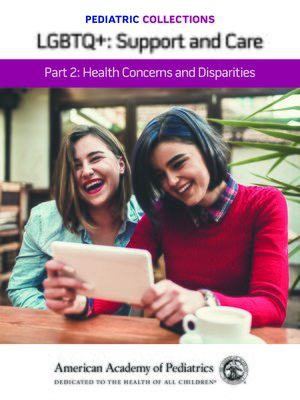Pediatric Collections
ebook ∣ LGBTQ+: Support and Care Part 2: Health Concerns and Disparities · Pediatric Collections
By American Academy of Pediatrics (AAP)

Sign up to save your library
With an OverDrive account, you can save your favorite libraries for at-a-glance information about availability. Find out more about OverDrive accounts.
Find this title in Libby, the library reading app by OverDrive.



Search for a digital library with this title
Title found at these libraries:
| Library Name | Distance |
|---|---|
| Loading... |
Pediatric Collections offers what you need to know - original, focused research in a snapshot approach.
Although most lesbian, gay, bisexual, transgender, and questioning youths are quite resilient and emerge from adolescence as healthy adults, the effects of stigma and heterosexism can contribute to health disparities. From a public health perspective, transgender and gender diverse (TGD) individuals, compared with their cisgender peers, experience substantially higher lifelong rates of anxiety, depression, self-harm and suicidality, substance use, eating disorders, victimization, homelessness, and incarceration. Pediatric primary care providers (PPCPs) can help foster early access to mental health, family support, and ongoing gender-affirming care that, ultimately, reduces the risk of gender dysphoria, isolation, and shame that many TGD youth unfortunately face. Part 2 of this first-of-its-kind 3-part series can help PPCPs become stronger allies for TGD patients and their families in the clinic, community, and beyond, providing the promise of both a medical home and a future that celebrates people for being true to themselves.
Although most lesbian, gay, bisexual, transgender, and questioning youths are quite resilient and emerge from adolescence as healthy adults, the effects of stigma and heterosexism can contribute to health disparities. From a public health perspective, transgender and gender diverse (TGD) individuals, compared with their cisgender peers, experience substantially higher lifelong rates of anxiety, depression, self-harm and suicidality, substance use, eating disorders, victimization, homelessness, and incarceration. Pediatric primary care providers (PPCPs) can help foster early access to mental health, family support, and ongoing gender-affirming care that, ultimately, reduces the risk of gender dysphoria, isolation, and shame that many TGD youth unfortunately face. Part 2 of this first-of-its-kind 3-part series can help PPCPs become stronger allies for TGD patients and their families in the clinic, community, and beyond, providing the promise of both a medical home and a future that celebrates people for being true to themselves.







